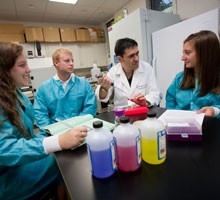
Professor Manuel Ospina-Giraldo (white coat) works with students on his research on late blight disease.
Research by Professor Manuel Ospina-Giraldo on the organism that caused the Irish Potato Famine is being funded as part of a $999,900 “Education in Genomics-Based Microbial Forensics” grant from the United States Department of Agriculture.
The grant, which is also funding projects by researchers at Penn State and Franklin & Marshall, is creating an integrated and educational environment in which participants apply microbial genomic data and tools to solve current and emerging issues important for the nation’s agriculture, food, and environmental systems.
Ospina-Giraldo is focusing on a group of genes in the fungal-like organism Phytophthora infestans, which causes the late blight disease in potato plants. Late blight played a major role in the Irish Potato Famine of 1845-49 and led to worldwide cultural and social changes. According to Ospina-Giraldo, late blight is extremely difficult to control and costs more than $6 billion annually in lost crops and other expenses around the globe.
Ospina-Giraldo, assistant professor of biology, has included numerous students in his research and recently published results of his investigations with students as coauthors. Megan Chawner ’08, John Griffith ’08, Karolyn Horn ’09, Jessica McWalters ’09, and Lauren Seyer ’08 coauthored an article in the journal Nature. McWalters and Seyer coauthored an article for Current Genetics. Griffith, Emma Laird ’09, and biology major Christina Mingora ’11 (Bethlehem, Pa.) published in BMC Genomics. Over the next four years, grant funds will allow at least 12 students to participate in the project.
His work has also been funded in part by a National Science Foundation grant, Lafayette’s EXCEL Scholars program, and student scholarships from the David M. Nalven ’88 Summer Research Fellowship and the Roger Newton ’72 Research Fund.
Ospina-Giraldo says working with undergraduates not only is a boost to their academic résumés, but also is a critical part of accomplishing his research.
“As a professor at Lafayette, I am fortunate to have access to some extremely bright and talented students,” he says. “The work conducted by my students has been of very high quality, as exemplified by our ability to publish our results in high-impact journals like Nature. Without the participation of undergraduate students, I would not have been able to achieve the goals proposed in my previous grant from the National Science Foundation and certainly would not be able to accomplish the objectives of this grant either.”
Ospina-Giraldo is the author or co-author of numerous journal publications and conference proceeding abstracts and presentations. He is a member of the American Association for the Advancement of Science, American Phytopathological Society, and Pennsylvania Academy of Sciences. He earned his Ph.D. at Penn State University and master’s and bachelor’s degrees at Universidad del Valle, Colombia.

1 Comment
Comments are closed.